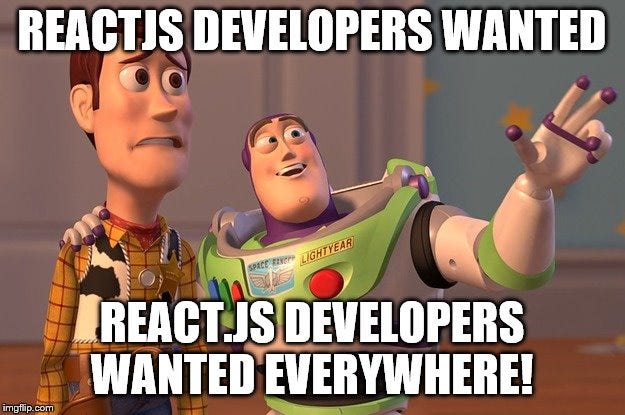A Technical Recruiter's Point of View: ReactJS
As a technical recruiter within the software industry, and a passionate specialist in Frontend Development specifically, I am no stranger to the modern and super popular JavaScript Library that is ReactJS. It seems to be EVERYWHERE.
I’ll be transparent and honest with you, I’m still learning a lot when it comes to React. But here is what I do understand, so far from my independent research and conversations with my network:
- ReactJS is an open-source JavaScript library for building user interfaces. It is maintained by Facebook, Instagram and a community of individual developers and corporations.
- You can build all sorts of single page applications. For example, chat messengers and e-commerce portals where you want to show changes on the user interface in real-time.
- A React app is comprised of components (a reusable piece of code, which defines how certain features should look and behave on the UI), a lot of them, nested into one another.

My clients are screaming out for ReactJS Developers left, right and centre; so I wanted to find out exactly why this library is so popular and why most Frontend Developers are choosing ReactJS over the likes of AngularJS and VueJS. I decided to reach out to my network and get their thoughts as to why ReactJS is so popular.
Simplicity
I was told by many that ReactJS is just simpler to grasp right away, especially if you have existing experience with AngularJS. The component-based approach, well-defined life-cycle, and use of just plain JavaScript make ReactJS very simple to learn, build a professional web (and mobile applications), and support it.
Easy to learn & fast learning curve
ReactJS is very a simple and lightweight library that only deals with the view layer. Anyone with a basic previous knowledge in programming can easily understand ReactJS, while AngularJS and EmberJS are referred to as ‘Domain specific Language’, implying that it is difficult to learn them. For ReactJS I’ve been told you just need basic knowledge of CSS and HTML. I was also told that it’s stable and doesn’t change every 2 years due to the need of improvements, which is amazing, if you like to keep updated with all of the new frontend libraries, tools and frameworks.
Performance
One developer told me that ReactJS doesn’t offer any concept of a built-in container for dependency. You can use Browserify, Require JS, EcmaScript 6 modules which we can use via Babel, ReactJS-di to inject dependencies automatically.
Testability
ReactJS applications are super easy to test. ReactJS views can be treated as functions of the state, so we can manipulate with state we pass to the ReactJS view and take a look at the output and triggered actions, events, functions, etc.
React Native
Learning ReactJS comes with an added and rewarding bonus: React Native. React is not a ‘write once run anywhere library’, as the creators say, it’s a ‘learn once write anywhere’ library. Mobile Developers usually use React Native as you can write native apps for Android and iOS using the library! However, you will not be able to use the exact same code you wrote for the web, you will be able to use the same methodology and the same architecture but it will require different code.
Now I can see why so many startups are adopting ReactJS and why so many established tech companies are transitioning from AngularJS to ReactJS.
I don’t think that ReactJS will be going anywhere anytime soon, based on its simplicity, testability, performance and learning curve, I feel it is a great frontend language to learn, focus on and build a career in. I’ll even be trying my own hand at ReactJS.. after mastering the basics of JavaScript so watch this space!
If you’re a Frontend Developer, I’d be very interested to hear your thoughts.
Do you prefer ReactJS over AngularJS & VueJS?
By Georgia Bartlett - Talent Partner / Frontend Specialist - Nordics
Proud Supporter of Women in Business


Comments
Be The First To Post